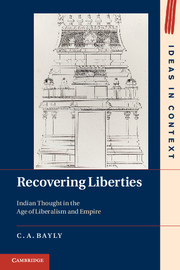Book contents
- Frontmatter
- Contents
- Preface
- Note on Indian names
- Introduction
- Chapter 1 The social and intellectual contexts of early Indian liberalism, c.1780–1840
- Chapter 2 The advent of liberalism in India
- Chapter 3 The advent of liberal thought in India and beyond
- Chapter 4 After Rammohan
- Chapter 5 Living as liberals
- Chapter 6 Thinking as liberals
- Chapter 7 Giants with feet of clay
- Chapter 8 Liberals in the Desh
- Chapter 9 ‘Communitarianism’
- Chapter 10 Inter-war
- Chapter 11 Anti-liberalism, ‘counter-liberalism’ and liberalism’s survival, 1920–1950
- Conclusion
- Glossary
- Select bibliography
- Index
- References
Chapter 5 - Living as liberals
Bengal and Bombay, c.1840–1880
Published online by Cambridge University Press: 05 June 2012
- Frontmatter
- Contents
- Preface
- Note on Indian names
- Introduction
- Chapter 1 The social and intellectual contexts of early Indian liberalism, c.1780–1840
- Chapter 2 The advent of liberalism in India
- Chapter 3 The advent of liberal thought in India and beyond
- Chapter 4 After Rammohan
- Chapter 5 Living as liberals
- Chapter 6 Thinking as liberals
- Chapter 7 Giants with feet of clay
- Chapter 8 Liberals in the Desh
- Chapter 9 ‘Communitarianism’
- Chapter 10 Inter-war
- Chapter 11 Anti-liberalism, ‘counter-liberalism’ and liberalism’s survival, 1920–1950
- Conclusion
- Glossary
- Select bibliography
- Index
- References
Summary
Liberals not only believed in a set of protean ideas about liberty and improvement. They also thought they were initiating a new code for living one’s life; a new way of being human. Indian liberals were not simply trying to build institutions or author a political language; they also sought to create a new subject, outside and beyond contemporary discourses of society and religion, and therefore capable of rationally assessing their worth. The ideological creation of the ‘public man’ was fundamental to the creation of the public sphere. The lived life of ideas is important to intellectual history because it created, in turn, new ways of thinking. It is the study of this performative aspect of liberalism which provides the intermediation between intellectual and social history and avoids the danger of flattening one into the other. This was indeed the upward hermeneutic in action; or, rather, as Foucault once observed, liberalism was a series of social and political projects informed by loosely linked sentiments.
Liberal thought in India was, therefore, generated out of an increasingly dense set of institutions, clustering around newspapers, educational foundations, the law, public meetings and learned societies. It was in this context that the sociological imagination of a new generation of public men was expanded by observing India and the world. The next two chapters examine the lived and thought lives of liberalism, particularly in the context of Victorian Calcutta and Bombay. The discussion moves outwards, from ‘peer education’, sociability and the experience of travel in this chapter, to liberals’ broader understandings of history, religion, society and economy in the next. While many earlier studies have delineated the Bengali reforming liberals as a subgroup of a middle-class or bourgeois formation, the term bhadra, to which they answered, actually designated individual cultivation or gentility, so it is appropriate to analyse them in terms of networks of instruction and knowledge.
- Type
- Chapter
- Information
- Recovering LibertiesIndian Thought in the Age of Liberalism and Empire, pp. 132 - 160Publisher: Cambridge University PressPrint publication year: 2011



